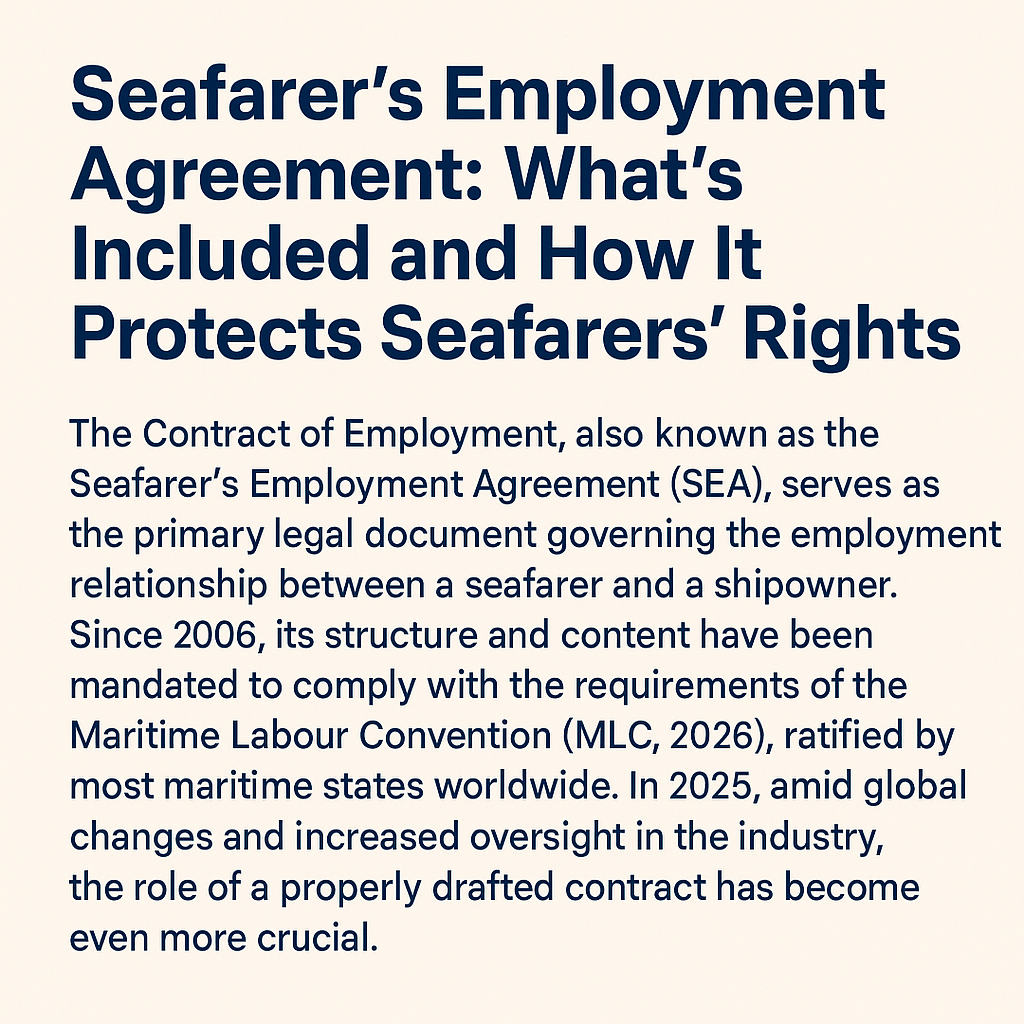PART 2 – TERMS AND CONDITIONS OF SEAFARER'S EMPLOYMENT
Collective Bargaining Fleet Agreement (CBFA)
Rest Periods
This article governs the minimum required rest time for each seafarer. It states that a seafarer must be granted at least 10 hours of rest within any 24-hour period and no less than 77 hours over a 7-day period. These periods may be split into two parts, one of which must be at least 6 hours, and the interval between them must not exceed 14 hours.
In emergency situations, the Master has the authority to suspend the rest schedule if necessary to safeguard the ship or human life. However, after the situation is resolved, the Master is obliged to compensate seafarers with an equivalent rest period. All hours of rest are to be recorded to ensure compliance. Mandatory drills should be conducted in a way that minimizes rest disruption and avoids fatigue.
This article governs the minimum required rest time for each seafarer. It states that a seafarer must be granted at least 10 hours of rest within any 24-hour period and no less than 77 hours over a 7-day period. These periods may be split into two parts, one of which must be at least 6 hours, and the interval between them must not exceed 14 hours.
In emergency situations, the Master has the authority to suspend the rest schedule if necessary to safeguard the ship or human life. However, after the situation is resolved, the Master is obliged to compensate seafarers with an equivalent rest period. All hours of rest are to be recorded to ensure compliance. Mandatory drills should be conducted in a way that minimizes rest disruption and avoids fatigue.
Wages
Seafarers are paid in accordance with the official wage scale.
For payroll purposes, a calendar month is considered to have 30 days. Furthermore, it is stipulated that non-cadet crew members aged 18 or older may not receive wages below the minimum set for an Ordinary Seaman (OS).
Seafarers are paid in accordance with the official wage scale.
For payroll purposes, a calendar month is considered to have 30 days. Furthermore, it is stipulated that non-cadet crew members aged 18 or older may not receive wages below the minimum set for an Ordinary Seaman (OS).
Wage Payment Procedure
Seafarers are entitled to receive their net wages on a monthly basis. Payments must be made in the following calendar month, accompanied by a detailed statement specifying the wage breakdown.
Seafarers are entitled to receive their net wages on a monthly basis. Payments must be made in the following calendar month, accompanied by a detailed statement specifying the wage breakdown.
Compensation for Unused Leave
Upon termination of employment, regardless of the reason, a seafarer is entitled to monetary compensation for any unused leave. Payment is calculated for each full month of service, and proportionally for partial months.
Upon termination of employment, regardless of the reason, a seafarer is entitled to monetary compensation for any unused leave. Payment is calculated for each full month of service, and proportionally for partial months.
Subsistence and Accommodation
If food or accommodation is not provided onboard, the company is obligated to offer equivalent services ashore. The quality of meals and lodging must meet established standards and ensure the seafarer's comfort.
If food or accommodation is not provided onboard, the company is obligated to offer equivalent services ashore. The quality of meals and lodging must meet established standards and ensure the seafarer's comfort.
Watchkeeping
Watchkeeping at sea, and if necessary in port, is to be organized on a three-watch system. The Master holds responsibility for the allocation of watches and may assign crew members to daywork duties as appropriate.
Watchkeeping at sea, and if necessary in port, is to be organized on a three-watch system. The Master holds responsibility for the allocation of watches and may assign crew members to daywork duties as appropriate.
Manning
The vessel must be staffed with a competent crew in sufficient numbers to ensure safe operations and maintain a three-watch system. Manning levels must not fall below the standards set by international law.
Temporary employment of additional personnel (riding squads) is permitted — for instance, for security or inspections — but only with union approval and under conditions that prohibit replacing the regular crew.
The vessel must be staffed with a competent crew in sufficient numbers to ensure safe operations and maintain a three-watch system. Manning levels must not fall below the standards set by international law.
Temporary employment of additional personnel (riding squads) is permitted — for instance, for security or inspections — but only with union approval and under conditions that prohibit replacing the regular crew.
Understaffing
In case of crew shortages, duties of absent members are temporarily distributed among other seafarers. Those assuming additional responsibilities are paid the basic wage of the missing positions. This arrangement does not cancel overtime payments under Article 7 and must be temporary — the company is required to restore full manning at the next port of call.
In case of crew shortages, duties of absent members are temporarily distributed among other seafarers. Those assuming additional responsibilities are paid the basic wage of the missing positions. This arrangement does not cancel overtime payments under Article 7 and must be temporary — the company is required to restore full manning at the next port of call.
Warlike Operations and High-Risk Areas
Seafarers have the right to refuse service in warlike operations areas without risk of dismissal or penalties. If the vessel proceeds to such an area, the seafarer may be repatriated at the company’s expense.
Additionally, the seafarer is entitled to a 100% bonus of their basic wage for each day spent in a war zone, with a minimum of 5 days’ pay. The company is responsible for timely notification regarding such zones. In cases of piracy or hijacking, the seafarer’s wages must continue to be paid until safe repatriation is arranged.
Seafarers have the right to refuse service in warlike operations areas without risk of dismissal or penalties. If the vessel proceeds to such an area, the seafarer may be repatriated at the company’s expense.
Additionally, the seafarer is entitled to a 100% bonus of their basic wage for each day spent in a war zone, with a minimum of 5 days’ pay. The company is responsible for timely notification regarding such zones. In cases of piracy or hijacking, the seafarer’s wages must continue to be paid until safe repatriation is arranged.
Crew Members’ Personal Effects
If a seafarer’s personal belongings are lost or damaged due to a shipwreck, fire, flooding, or other emergency not caused by their own fault, the company must provide compensation within the limits established by the agreement.
In cases of illness, injury, or death, the company is also responsible for the safekeeping and return of the seafarer’s personal belongings.
If a seafarer’s personal belongings are lost or damaged due to a shipwreck, fire, flooding, or other emergency not caused by their own fault, the company must provide compensation within the limits established by the agreement.
In cases of illness, injury, or death, the company is also responsible for the safekeeping and return of the seafarer’s personal belongings.
Termination of Employment
A seafarer’s contract may be terminated:
– upon completion of the agreed term of service;
– due to illness or injury (based on medical assessment);
– at the company’s initiative with one month’s notice;
– in case of disciplinary violation;
– due to total loss, sale, or extended lay-up of the vessel.
The seafarer may also terminate the contract early for valid reasons, such as a serious illness in the family, a significant change in the voyage route, vessel detention, or breach of contract by the company.
A seafarer’s contract may be terminated:
– upon completion of the agreed term of service;
– due to illness or injury (based on medical assessment);
– at the company’s initiative with one month’s notice;
– in case of disciplinary violation;
– due to total loss, sale, or extended lay-up of the vessel.
The seafarer may also terminate the contract early for valid reasons, such as a serious illness in the family, a significant change in the voyage route, vessel detention, or breach of contract by the company.
Repatriation
The company is required to arrange the seafarer’s repatriation in a safe and comfortable manner, covering:
– per diem (daily basic wage);
– meals and accommodation;
– transportation to the seafarer’s home or original port of engagement;
– transport of personal belongings (within the free baggage allowance).
If termination was initiated by the company or occurred for justified reasons, repatriation costs are borne by the shipowner. If termination occurred due to disciplinary violations or unjustified resignation by the seafarer, the costs may be recovered from the seafarer.
The company is required to arrange the seafarer’s repatriation in a safe and comfortable manner, covering:
– per diem (daily basic wage);
– meals and accommodation;
– transportation to the seafarer’s home or original port of engagement;
– transport of personal belongings (within the free baggage allowance).
If termination was initiated by the company or occurred for justified reasons, repatriation costs are borne by the shipowner. If termination occurred due to disciplinary violations or unjustified resignation by the seafarer, the costs may be recovered from the seafarer.




